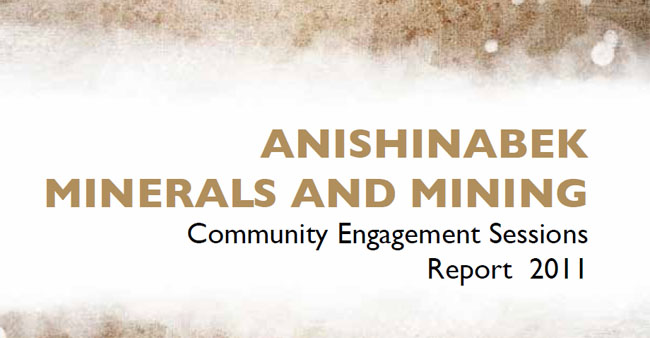Truth and Reconciliation Commission recommends environmental stewardship and protection of our natural resources

The Truth and Reconciliation Commission (TRC) “Calls to Action” Report introduced in June 2015 recommended that Canadian governments at all levels use the United Nations Declaration of Rights of Indigenous Peoples as the framework for reconciliation.
TRC Reconciliation recommendations 43 and 44 state: “We call upon federal, provincial, territorial, and municipal governments to fully adopt and implement the United Nations Declaration on the Rights of Indigenous Peoples as a framework for reconciliation…We call upon the Government of Canada to develop a national action plan, strategies, and other concrete measures to achieve the goals of the United Nations Declaration on the Rights of Indigenous Peoples. Furthermore, at a TRC Traditional Knowledge Keepers Forum in Winnipeg in 2014, Mary Deleary, an Anishinaabe Elder expressed very clearly that the work of reconciliation must continue in ways that honour our ancestors, respect the land, and re balance relationships.
She emphasized: “I’m so filled with belief and hope because when I hear voices the voices at the table, I hear and know that the responsibilities that our ancestors carried … are still being carried… even through all of the struggles, even though all of what has been disrupted… we can still hear the voices of the land…. The land is made up of the dust of our ancestors’ bones. And so to reconcile with this land and everything that has happened, there is much work to be done.”
The TRC Report entitled Honouring the Truth, Reconciling the Future defines a reconciliation framework is one in which Canada’s political and legal systems, educational and religious institutions, the corporate sector and civic society function in ways that are consistent with the principles set out in the United Nations Declaration on the Rights of Indigenous Peoples, which Canada has endorsed.
The TRC further states “that together Canadians must do more than just talk about reconciliation: we must learn how to practice reconciliation in our everyday lives- within ourselves and our families, and in our communities, governments, places of worship, schools, and workplaces. To do so constructively, Canadians must remain committed to the ongoing work of establishing and maintaining respectful relationships.”
Article 29 (1) of the United Nations Declaration on the Rights of Indigenous Peoples recognizes the need for protection of the environment:
“Indigenous peoples have the right to the conservation and protection of the environment and the productive capacity of their lands or territories and resources. States shall establish and implement assistance programs for indigenous peoples for such conservation and protection, without discrimination.”
Further, Article 19 emphasizes that Indigenous peoples have the right to self determination and thus need to provide free, prior and informed consent.
“States shall consult and cooperate in good faith with indigenous peoples concerned through their own representative institutions in order to obtain free, prior and informed consent before adopting and implementing legislative or administrative measures that affect them.”
The 2009 Anishinabek Mining Strategy Report entitled “Below the Surface” based on extensive consultation with the Anishinabek leadership and membership recommended that the Ontario government amend the Mining Act to ensure the environmental protection. The report stated that:
“…, First Nations traditional role as stewards of the land be recognized and supported in this Act as well as First Nations overarching goal to ensure the protection of Mother Earth for seven generations and beyond and ensuring the protection of the land in its natural state.”
This Strategy further recommended the environmental protection of water as being essential to life at all levels:
“Water is the lifeblood of Mother Earth and the source of all life. As such, the protection of water is of paramount importance to First Nations. Exploration and mining activity must not affect the quality and quantity of water whatsoever;
When evaluating mining proposals the following issues concerning water be considered and taken into account:
• Adequate provisions must be made to protect all bodies of water potentially affected by mining activities in particular exploration and mining under lakes;
• First Nations interests in lakebeds and off-shore interests have never been ceded. There is a likelihood of claims being submitted in future.”
The 2009 Mining strategy further recommended that First Nations be involved in environmental assessment as a means to ensure Anishinabek Environmental stewardship:
“First Nations must be involved in all aspects of the environmental assessment process respecting the approval of a mine, ongoing monitoring of the mine and mine closure planning and closure operations. The purpose is to prevent unintended consequences of mining on other aspects of the environment.”
In 2010 and 2011 the Union of Ontario Indians conducted further consultations on the proposed mining regulations. Anishinabek leadership and membership emphasized the importance of protecting the environment and Anishinabek Traditional Knowledge (ATK). The report entitled, Anishinabek Minerals and Mining Community Engagement Sessions, 2011 pointed out that:
Participants… expressed serious concerns over confidentiality and protection of ATK. They emphasized that ATK was important to the First Nation culture and tradition and that and that an element of trust with government was needed.
“They stressed that it is important to guard ATK confidentiality during the planning and operations phase. ….”
It is clear that the Anishinabek Nation regards environmental stewardship and the protection of traditional knowledge of paramount importance. Anishinabek Elder Jim Dumont, emphasized this importance at the 2014 Traditional Knowledge Keepers Forum in 2014 as quoted in the TRC report entitled Honouring the Truth, Reconciling the Future: “In Ojibwe thinking, to speak the truth is to actually speak from the heart.”
The Canadian government committed to implementing all the recommendations of the TRC in their Throne Speech on December 4, 2015 and the Anishinabek Nation and its membership look forward to having all Canadian governments and citizens respecting and honouring our environment.

